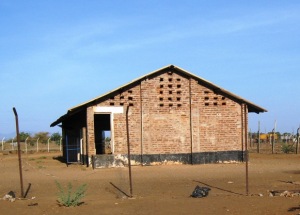Volume 1, Issue 4-5 / March-April 2009
No refugee cases were brought before the March hearings of the Mobile Court in Kakuma, where local cases are heard on a monthly basis.

The March session of the mobile court was held in Kakuma during the end of February and the beginning of March. A few cases were tried, with none involving refugees.
As Kakuma does not have a court where cases can be heard on a daily basis—as in larger cities such as Lodwar or Kitale—a mobile court visits Kakuma periodically. Court cases are collected and held until the next hearing date when a mobile court travels to Kakuma from Lodwar, the district headquarters of Central Turkana District.
Both local Kenyans and refugees are subject to the jurisdiction of Kenyan law and can be brought before the mobile court.
According to the Camp Manager, Mr. William Lenaremo, the mobile court system runs smoothly and addresses all cases on a timely basis. “All cases are seen and attended to equally,” he reports. “If a file has been submitted to the court, then that case will be heard. No case is left unattended because the court always comes here and stays for a week, which is enough time to look into all cases forwarded.”
UNHCR assigns a lawyer to facilitate and observe proceedings brought before the mobile court. UNHCR lawyers do not act as an advocate for refugees. Mr. Lenaremo states that refugees can only access a defense lawyer it they can afford the fees.
According to the Somali Community Chairperson, Mr. Jama, “Refugees do not have lawyers to defend them. The UNHCR takes that responsibility, but with minimum contribution. UNHCR lawyers just come to listen. I have not seen so far a UNHCR lawyer advocating for refugees at the court.”
Three different courts travel to Kakuma to see cases. The High Court is presided over by a Judge from Kitale, and deals with capital cases such as murder and treason. The High Court visits Kakuma twice per year.
A Senior Resident Magistrate Court presided over by a Magistrate from Lodwar deals with crimes such as rape, robbery with violence, and petty crimes. The Senior Resident visits Kakuma four times a year.
The Kadhi’s court is presided over by a Kadhi Judge from Kitale and deals with cases relating to Muslim law such as marriage and divorce disputes. The Kadhi’s Court visits Kakuma once every three months.
